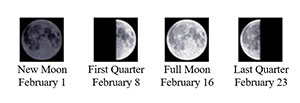Light Pollution Does More Damage Than Just Interfering With Astronomers
Opinion Advocates for ideas and draws conclusions based on the author/producer’s interpretation of facts and data.
 By Scott Levine
By Scott Levine
We often talk about the skies the ancients saw and about how those skies inspired them. We still use many of their lessons, even though the skies just don’t look how we imagine they did ages ago.
Toward the end of 2021, the city of Pittsburgh announced that it would soon take steps to reduce light pollution. Other American cities have done this before. For instance, Flagstaff, Ariz. first adopted laws addressing light pollution in 1958.
Like Flagstaff, most of these places are in the western part of our country. Pittsburgh, though, will become the first city in the denser, eastern U.S. to take steps to reduce light pollution and encourage darker nights.
Light pollution is the wasteful use of artificial light, primarily at night, which then brightens skies. All the lights you see as you drive past or fly over a city is light going somewhere it’s not useful. Many people see this as a joke, but it is a serious problem, far beyond the beauty of dark skies.

Along with interfering with astronomy, light pollution affects the well-being and life cycles of plants and animals. It causes illness, injury and trouble with animals’ reproduction and migration.
It’s bad for people, too. Studies link the loss of dark skies to some types of cancers, particularly breast and prostate cancer. It contributes to stress, burn-out, loneliness and disconnection from other people.
More light doesn’t equal more safety, either. Statistics suggest crime in over-lighted areas actually increases. This could be because they give free, steady, consistent light to criminals, no flashlight needed. The same is true for using bright lights to ward off racoons and other wild animals.
Who of us in Westchester and Putnam hasn’t been blinded by painfully bright streetlights while driving?
Most important to some, light pollution wastes money. These lights don’t run for free. This means we, nearby businesses and our local governments spend money turning night into day just to light trash bins and empty parking lots.
According to a Sky & Telescope article from Oct. 21, 2021, Pittsburgh’s ordinance requires these changes only in public places at first. Over the next 18 months, 35,000 old high-pressure sodium lights will be replaced with LED streetlights designed to encourage darker skies.
These new laws will also require Pittsburgh to replace thousands of new LED streetlights – the blindingly bright type we see popping up all over Westchester – with softer, warmer-colored lights that are easier on the eyes and healthier to live with.
No one is suggesting we live in darkness, but we can all take part in changing and improving this. We can turn off unnecessary lights. We can redirect and shield our outdoor lighting so it goes only where it’s needed and we can switch to warmer-colored bulbs. We can also join the International Dark-Sky Association (www.darksky.org).
But it shouldn’t all be on us. If a dense city like Pittsburgh can make these changes, why not the municipalities in Westchester? I call on our local governments to enact and enforce laws to protect dark skies. I hope you’ll reach out to your local government and demand changes, too.
We need dark skies. They’re part of who we are and they are where we’re going. Let’s do this together.
Scott Levine (astroscott@yahoo.com) is an astronomy writer and speaker from Croton-on-Hudson. He is also a member of the Westchester Amateur Astronomers, who are dedicated to astronomy outreach in our area. For information about the club including membership, newsletters, upcoming meetings and lectures at Pace University and star parties at Ward Pound Ridge Reservation, visit westchesterastronomers.org.

Examiner Media – Keeping you informed with professionally-reported local news, features, and sports coverage.

 By Scott Levine
By Scott Levine